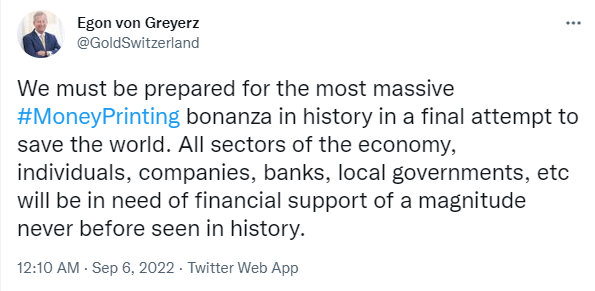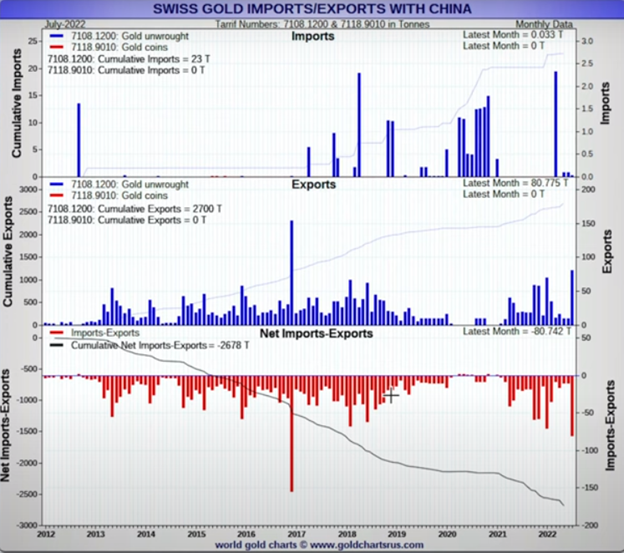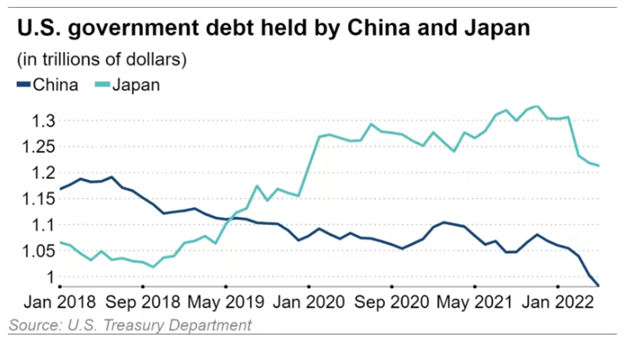Did you know you can get the Sprott Money Weekly Wrap Ups, Ask The Expert,
special promotions and insightful blog posts sent right to your inbox?
Sign up to the Sprott Money Newsletter here.
Back in December 2017, I did a podcast with Dale Pinkert on YouTube where I said that the Fed will buy “everything” when the proverbial hits the fan and that this would trigger the collapse of the dollar. Today (Wednesday), I saw this tweet:

As I like to say: Bingo! The U.S. led the way, but now the Europeans are joining in:
'Incoming PM Truss Drafts Colossal £130 Billion Plan To Freeze UK Power Bills'
'Germany Announces Another €65Bn Energy Stimulus Even As ECB Seeks To Crush Demand'
All of these headlines came out one after the other, as if they were coordinated. Expect more to come from the rest of Europe soon. They are all planning to either cap prices for electricity, bail out the energy companies that suffer losses as a result, provide relief payments to customers nationwide, or all of the above. This is fiscal spending, plain and simple. While the numbers are relatively small in a world where trillions are common parlance these days, they are likely to rise. Given Russia’s combative stance on energy supply, or the lack thereof, this is likely to get worse before it gets better, and the numbers will climb significantly. Who’s going to fund the ballooning deficits and debts? The central banks. But they are all raising rates right now to curtail rampant inflation. Will we see central banks reverting to QE to buy the new debt while raising rates to combat inflation? Possibly.
The problem for the central banks is that reducing demand in the economy by jacking up interest rates is an indirect way to try to reduce inflation, but money printing means more currency chasing fewer goods and services. We’re already seeing small businesses collapse across Europe as a result of soaring energy costs. More QE would also likely weaken the euro even further, throwing gasoline on the fire of inflation. In financial terms, this is akin to a death spiral.
At the risk of stating the obvious, you can’t defeat inflation by spending more! Price controls never work. All they do is reduce supply because producers are not compensated for their costs and so they stop producing. Electricity is a necessity; therefore, demand remains stable. Less supply but the same demand means higher prices. Bailouts are just a band-aid on a deep wound. Nationalization becomes a very real possibility thereafter, and we all know how efficient the government is at managing businesses. Look at the deficits and debts they have created. Price controls will drive the cost of electricity even higher, which means governments have to spend more and more to maintain the same price for the consumer. Where does it end? It ends with weaker currencies and even higher levels of inflation. This is unsustainable.
Switching to the United States, the Inflation Reduction Act and Student Loan Forgiveness means spending another trillion plus on top of a deficit that is almost $1.5 tln and Federal debt approaching $31 tln. At $31 tln and an average duration of circa four years, higher interest rates and Treasury bond yields mean that the interest cost on the debt will soar, ballooning the deficit even further. Then add lower tax receipts as capital gains taxes plummet as stocks and bonds fall, income taxes dump as unemployment rises (see jobless claims and unemployment survey), and corporate taxes fall with earnings as demand contracts and production costs soar. How will the government fund even bigger deficits? Issue more treasury debt. Again, who is going to buy the debt? Central banks, led by the Fed. The Fed will have to pivot sooner rather than later or the whole house of cards collapses. While the dollar will likely continue to rise against the sliding euro and yen, its days are numbered also. It may be the last to fall, but when it does, it will be brutal, imho.
Simply put, fiscal spending must be funded with more debt issuance, and the only major players left remaining to buy that debt is the central banks. They will also need to cap yields on the bonds to avoid insolvency. See Japan. Meanwhile, currencies are devalued daily, some faster than others, and inflation roars higher. Capped yields and higher inflation mean lower real yields are coming. When that happens, Gold and Silver will benefit handsomely.
Lastly, China. They have their own problems with a collapsing real estate market and rising credit defaults. But what are they doing? They continue to load up on Gold faster than a squirrel gathering nuts in the fall. This information comes from Mike Maloney and Nick Laird: Below in red is the net exports of Gold to China from refineries in Switzerland.

They are the biggest importer of Gold in the world and also the biggest producer of Gold globally, at over ~400 tonnes annually. When you take the fact that they have imported 2,678 tonnes in the past 10 years, that alone exceeds their official holdings of 1900 tonnes. When you add their Gold production over the past several decades and production from mines they have bought all over the world, the number is likely closer to 20,000 tonnes, imho. It is also illegal to take 1 oz. of Gold out of the country.
At the same time, China is once again dumping their U.S. Treasury holdings:
China's Treasury holdings drop below $1tn to 12-year low

Why is China selling U.S. Treasury Bonds and buying Gold? Because they no longer have confidence in U.S. assets given what happened to Russia’s dollars? Or have they lost faith in the dollar? Probably a little of both.
Given the fiscal and monetary policies of the West, led by the United States, and the weaponization of the dollar, the East is clearly turning away from the dollar. Based on recent fiscal spending announcements in Europe and the U.S., this dedollarization is likely to accelerate. What is the alternative of choice? Gold!
China, Russia, and India, in particular, play the long game. They don’t care about daily volatility in Gold. They’re preparing for Gold to return to center stage of the global monetary system at the expense of fiat currencies, primarily the dollar. You should prepare too. “Follow the smart money.”
Don’t miss a golden opportunity.
Now that you’ve gained a deeper understanding about gold, it’s time to browse our selection of gold bars, coins, or exclusive Sprott Gold wafers.

About Sprott Money
Specializing in the sale of bullion, bullion storage and precious metals registered investments, there’s a reason Sprott Money is called “The Most Trusted Name in Precious Metals”.
Since 2008, our customers have trusted us to provide guidance, education, and superior customer service as we help build their holdings in precious metals—no matter the size of the portfolio. Chairman, Eric Sprott, and President, Larisa Sprott, are proud to head up one of the most well-known and reputable precious metal firms in North America. Learn more about Sprott Money.
Learn More
You Might Also Like:













Looks like there are no comments yet.